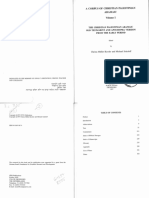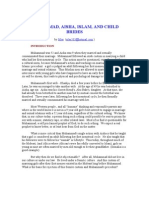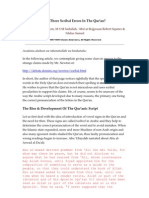Did Muhammad Exist
Did Muhammad Exist
Uploaded by
Alperenler44Copyright:
Available Formats
Did Muhammad Exist
Did Muhammad Exist
Uploaded by
Alperenler44Copyright
Available Formats
Share this document
Did you find this document useful?
Is this content inappropriate?
Copyright:
Available Formats
Did Muhammad Exist
Did Muhammad Exist
Uploaded by
Alperenler44Copyright:
Available Formats
Humanism Ireland No 135 July-August 2012
Books
Roy Brown (former President, IHEU)
Did Muhammad Exist?
Robert Spencer ISI Books 2012
Also blown away by this comprehensive reappraisal of the evidence is the idea that there is only one Koran. Even discounting the discovery of many early Koranic manuscripts which show a large number of variants, the existence today of two significantly different editions of the Koran, one circulating in the Middle East and the other in West and North-West Africa, should finally lay that myth to rest. What then do we really know about Islam and the Koran? Little of modern belief regarding their origins stands up to detailed scrutiny . The beliefs now attributed to Muhammad arose in the religious milieu of the 7th century Middle East, from Arabia and conquered lands from Syria and Persia to Egypt. The written texts which ultimately became the Koran and which owed much to a strictly monotheistic version of Christianity were then garbled as their Arabic translators failed to understand the meaning of much of the original Syriac, the lingua franca of the Middle East at that time. The consolidation of these beliefs and texts into what became the Islamic canon dates from considerably later than the Islamic sources suggest. In particular, the story of the final compilation of the Koran by Caliph Uthman can no longer be viewed as authentic. The Arab conquests of the Middle East and North Africa took place without any Koranic exhortation to conquer the infidel. Why else would the leaders of the Arab conquests have minted coins bearing the Christian cross? And why would an army that conquered lands from Spain to the Indus valley have left no record (in either Arabic sources or in commentaries of the conquered) of Islam or the Koran? But as Spencer notes: In Islam, not only is the political component intrinsic to the faith in a way that it never was in Christianity even at the height of the Middle Ages and never was in any other faith, but in Islam the political and martial was historically primary. If there was any religious aspect to the Arab conquests at all it would have been in promoting a monotheistic, antitrinitarian version of Christianity that denied the orthodox view of Jesus as divine. Whatever Islamic mythology may tell us about what Allah revealed to Muhammed via the Angel Gabriel, it bore a striking resemblance to Nestorian Christianity . Will this book have any impact on the minds of Muslims, dent their faith or sow the seeds of doubt? Probably not, if evidence from the impact of research into early Christianity on the minds of believers is a yardstick Spencer concludes his book with the thought that in the minds of the fervent believers in Islam, Muhammad most certainly existed and continues to exist, and still does exactly what he was made to do: to inspire, motivate, unify, and comfort the hearts of the believers. For them, whether or not Muhammad existed never was a question, never will be, and never could be. But be that as it may, Did Muhammad Exist? is a mustread for anyone with a genuine interest in the origins of Islam and the Koran. The evidence is there. This review appeared in International Humanist News, May 2012
ID MUHAMMAD EXIST ? by Robert Spencer is a highly readable summary of recent research into the origins of Islam and the Koran. But by choosing a title calculated to get up the noses of every Muslim, Robert Spencer has done his work a grave injustice. Even so, Did Muhammad Exist? may well come to be seen as the most important popular work written to date on the origins of a religion that now holds sway over the hearts and minds of more than one billion people. Unlike research into early Christianity that began in Germany in the 19th century, and which demonstrated the Roman political origins of Christianity and the Bible, serious historical research into the origins of Islam is of very recent date, many of the most important discoveries having been made in just the past few years. A better title for this tour de force would have been The Christian Origins of Islam because this is precisely what Spencer, by bringing together an extraordinary array of evidence from both Islamic and Western sources, has managed to demonstrate. Islam emerged as a distortion of a particular branch of early Christianity. His book leaves little room for doubt in the mind of any impartial reader a truly remarkable achievement. Spencer brings to the wider public a wealth of numismatic, archaeological, linguistic and textual research which shows that the Arab conquests of the 7th century had little or nothing to do with Islam as we know it today; that the Koran is a compilation far later in date than most of the Islamic world believes; that many of the least comprehensible passages in the Koran are incomprehensible because the words used are of Syriac origin and appear here in Arabic for the first time; and that many of the stories in the Hadith (the sayings of Muhammad) are later compositions aimed at lending authenticity to this or that political position. But regarding the question posed in the title, it seems that we can conclude that there was a tribal leader, a warlord, who lived in the early part of the 7th century and who was given the honorific title Muhammad (the splendid one), a title which had earlier been given to Jesus: a misunderstanding that ultimately gave rise to the entire myth of the revelation of the Koran. Many obscure passages of the Koran have been clarified by the finding that many of these words are of Syriac origin, the most notorious of these being the promise of the 72 virgins, a misreading of the Syriac for ripe fruit! Other obscurities arose because the earliest Arabic texts did not contain the necessary diacritical marks differentiating between consonants, which meant that many words could be misread. And the absence of vowel signs in the earliest texts added further to the confusion. But happily for those who wish for a deeper understanding of the Koran modern scholarship has managed to shed light on many of these mysteries and clarify their probable original meaning.
22
You might also like
- Hillenbrand, Carole - Islam - A New Historical Introduction-Thames and Hudson LTD (2015)Document297 pagesHillenbrand, Carole - Islam - A New Historical Introduction-Thames and Hudson LTD (2015)6q957hnrxdNo ratings yet
- MullerKessler Sokoloff Corpus of Christian Palestinian Aramaic IDocument165 pagesMullerKessler Sokoloff Corpus of Christian Palestinian Aramaic IDavid BuyanerNo ratings yet
- Blakemore Frith 2005 The Leaning BrainDocument221 pagesBlakemore Frith 2005 The Leaning BrainVictor MN100% (3)
- The Heart of Islam: Enduring Values for HumanityFrom EverandThe Heart of Islam: Enduring Values for HumanityRating: 4.5 out of 5 stars4.5/5 (13)
- Al-Itqan Fi 'Ulum Al-Qur'an - EnglishDocument428 pagesAl-Itqan Fi 'Ulum Al-Qur'an - EnglishAdam آدمNo ratings yet
- Executive Directors GuideDocument8 pagesExecutive Directors Guideerice.researchNo ratings yet
- Zohra Greenhalgh - ContrarywiseDocument245 pagesZohra Greenhalgh - Contrarywisevictoria_balogh7975No ratings yet
- Patricia Crone, What Do We Actually Know About Muhammad, OpendemocracyDocument6 pagesPatricia Crone, What Do We Actually Know About Muhammad, OpendemocracyRasoul NamaziNo ratings yet
- Religious Freedom and The Law of Apostasy in Islam - M - AyoubDocument15 pagesReligious Freedom and The Law of Apostasy in Islam - M - AyoubMhmed NawafNo ratings yet
- Did Muhammad Exist?: An Inquiry into Islam’s Obscure Origins—Revised and Expanded EditionFrom EverandDid Muhammad Exist?: An Inquiry into Islam’s Obscure Origins—Revised and Expanded EditionRating: 3.5 out of 5 stars3.5/5 (8)
- John of Damascus On The Quran PDFDocument17 pagesJohn of Damascus On The Quran PDFSimon Devram100% (3)
- History of Economic Thought1 Before Adam SmithDocument572 pagesHistory of Economic Thought1 Before Adam Smithscott F1100% (5)
- End Focus and End Weight PrinciplesDocument12 pagesEnd Focus and End Weight PrinciplesAlinaAdrianaNo ratings yet
- M. O'Connor, The Arabic Loanwords in Nabatean AramaicDocument17 pagesM. O'Connor, The Arabic Loanwords in Nabatean AramaicShep SmithNo ratings yet
- 20 Early Islam An Alternative Scenario of Its Emergence - Korr Markus1Document34 pages20 Early Islam An Alternative Scenario of Its Emergence - Korr Markus1Gruz Fruz100% (1)
- Trade and Rise of Islam by Patricia CroneDocument13 pagesTrade and Rise of Islam by Patricia Cronealisyed370% (1)
- Athanasian CreedDocument2 pagesAthanasian Creedbruce1nessNo ratings yet
- Aisha RaDocument8 pagesAisha RammedialloNo ratings yet
- Prophet Muhammad Was A LooterDocument3 pagesProphet Muhammad Was A LooternoasNo ratings yet
- Muslim Thought: Its Origin and Achievements, by M.M. Sharif - Edited, With Notes, Bibliography and IntroductionDocument206 pagesMuslim Thought: Its Origin and Achievements, by M.M. Sharif - Edited, With Notes, Bibliography and IntroductionHuzaifa AnsNo ratings yet
- Anselm TormedaDocument3 pagesAnselm TormedaAmante de JesusNo ratings yet
- Ahl Al Kitab People of The BookDocument10 pagesAhl Al Kitab People of The BookAzri ZainiNo ratings yet
- Islamisation in Pakistan From Islamic Republic To Islamic StateDocument70 pagesIslamisation in Pakistan From Islamic Republic To Islamic State朱广渊100% (2)
- The Age of Marriage in The BibleDocument21 pagesThe Age of Marriage in The BibleZaky MuzaffarNo ratings yet
- Early Islam 07 - Ohlig Muhammad Jesus 11 SeptDocument63 pagesEarly Islam 07 - Ohlig Muhammad Jesus 11 SeptDhaif LazharNo ratings yet
- (Lies Rebuttal Series) Was Uzayr (Ezra) Called The Son of GodDocument5 pages(Lies Rebuttal Series) Was Uzayr (Ezra) Called The Son of Godabuali-almaghribi100% (2)
- The Constitution of MedinapdfDocument21 pagesThe Constitution of MedinapdfNajmi AhmadNo ratings yet
- The Bible and Islam - SmithDocument164 pagesThe Bible and Islam - SmithChristine Carey100% (1)
- Keith Small Quranic Window New Testament Textual HistoryDocument7 pagesKeith Small Quranic Window New Testament Textual HistoryseanaseymourNo ratings yet
- Syriac Influence Quran PDFDocument22 pagesSyriac Influence Quran PDFdiego_guimarães_64No ratings yet
- A Rose in The DesertDocument21 pagesA Rose in The DesertMarco Di BrancoNo ratings yet
- Theories About The Creation of UniverseDocument2 pagesTheories About The Creation of UniverseSmile Abellera ImperioNo ratings yet
- Muhammad Bin Abdul Wahhab PDFDocument13 pagesMuhammad Bin Abdul Wahhab PDFlabib salindawan100% (1)
- Madinah Returns To Center-Stage in Akhir Al-ZamānDocument8 pagesMadinah Returns To Center-Stage in Akhir Al-ZamānSameer FasihNo ratings yet
- Remembering MuḥammadDocument19 pagesRemembering Muḥammadplotinus2No ratings yet
- Muhammad The CowardDocument6 pagesMuhammad The CowardCrossMuslimsNo ratings yet
- The Birmingham Quran Folios and A BriefDocument12 pagesThe Birmingham Quran Folios and A BriefAndreasNo ratings yet
- The Fallacy of The TrinityDocument5 pagesThe Fallacy of The TrinityEden100% (1)
- Inscriptions of The Islamic World. CairoDocument4 pagesInscriptions of The Islamic World. CairoSari Saltuk BabaNo ratings yet
- Islam and Female Child BridesDocument5 pagesIslam and Female Child Brides123kkscribdNo ratings yet
- Muhammad in IslamDocument64 pagesMuhammad in IslamChristine CareyNo ratings yet
- IS505 Lecture 2 The Development of Early Islam According To The Neo Revisionists 600 750Document97 pagesIS505 Lecture 2 The Development of Early Islam According To The Neo Revisionists 600 750Daniel IndrawanNo ratings yet
- Are There Scribal Errors in The QuranDocument8 pagesAre There Scribal Errors in The QuranMohsin KhaleelNo ratings yet
- Fedeli15PhD PDFDocument501 pagesFedeli15PhD PDFNacer BenrajebNo ratings yet
- Fabrications in The New TestamentDocument8 pagesFabrications in The New Testamentyoudontknowmehomey100% (1)
- What Do We Actually Know About MohammedDocument6 pagesWhat Do We Actually Know About MohammedCalvin OhseyNo ratings yet
- The Original Sources of The QuranDocument85 pagesThe Original Sources of The QuranA.J. MacDonald, Jr.No ratings yet
- New Doc Texts and The Earlu Islamic State - HoylandDocument22 pagesNew Doc Texts and The Earlu Islamic State - Hoylandsarabaras100% (1)
- John of Damascus On The QuranDocument17 pagesJohn of Damascus On The QuranDrWhoF100% (1)
- The Jewish Foundation of Islam by Charles C Torrey PDFDocument70 pagesThe Jewish Foundation of Islam by Charles C Torrey PDFEzaz Ullah0% (1)
- Qishash Al AnbiyaDocument20 pagesQishash Al AnbiyairfanyNo ratings yet
- Zoroastrianism (Parsism) Influence On Islam (Ignaz Goldziher)Document15 pagesZoroastrianism (Parsism) Influence On Islam (Ignaz Goldziher)bozomuNo ratings yet
- The Death of a Prophet: The End of Muhammad's Life and the Beginnings of IslamFrom EverandThe Death of a Prophet: The End of Muhammad's Life and the Beginnings of IslamRating: 5 out of 5 stars5/5 (1)
- Muhammad and The BelieversDocument16 pagesMuhammad and The BelieverspeterfaresNo ratings yet
- Muhammad's Inspiration by JudaismDocument14 pagesMuhammad's Inspiration by JudaismCheradenine75% (4)
- The Emergence of Islam: Classical Tradtion in Contemporary PerspectiveFrom EverandThe Emergence of Islam: Classical Tradtion in Contemporary PerspectiveRating: 5 out of 5 stars5/5 (1)
- Islamo Christian CivilizationDocument12 pagesIslamo Christian CivilizationTri Joko SetiadiNo ratings yet
- Are Dolphins Really Smart The Mammal Behind The MyDocument4 pagesAre Dolphins Really Smart The Mammal Behind The MyAlperenler44No ratings yet
- Essay Review: The Human Nature ReviewDocument13 pagesEssay Review: The Human Nature ReviewAlperenler44No ratings yet
- Reps ExercisesDocument1 pageReps ExercisesAlperenler44No ratings yet
- Grants and Cooperative Agreements To Non-Governmental OrganizationsDocument90 pagesGrants and Cooperative Agreements To Non-Governmental OrganizationsAlperenler44No ratings yet
- List of Contributors List of Figures List of Tables Preface: Re Ections On Input-Output EconomicsDocument3 pagesList of Contributors List of Figures List of Tables Preface: Re Ections On Input-Output EconomicsAlperenler44No ratings yet
- Shamanism Part 4Document30 pagesShamanism Part 4Alperenler44No ratings yet
- "All The Khan's Horses" by Morris RossabiDocument3 pages"All The Khan's Horses" by Morris RossabiAlperenler44No ratings yet
- Study of History 5018264 MBPDocument638 pagesStudy of History 5018264 MBPAlperenler44100% (2)
- Ir 206 YaDocument9 pagesIr 206 YaAlperenler44No ratings yet
- Faculty of Economics & Administrative Sciences: 2012/13 Fall Semester FINAL Exam ScheduleDocument4 pagesFaculty of Economics & Administrative Sciences: 2012/13 Fall Semester FINAL Exam ScheduleAlperenler44No ratings yet
- Primitive Religion Its Nature and OriginDocument345 pagesPrimitive Religion Its Nature and OriginRahim4411100% (1)
- Teaching Pre-Literate Adult Refugee Students PDFDocument116 pagesTeaching Pre-Literate Adult Refugee Students PDFteacherthelma100% (1)
- Jurisprudence: Arvind Nath Tripathi DsnluDocument11 pagesJurisprudence: Arvind Nath Tripathi DsnluashutoshNo ratings yet
- Neufeld Review - November - 22 - 12 - 0Document4 pagesNeufeld Review - November - 22 - 12 - 0m1i2r3e4l5a6No ratings yet
- Music Informal Learning and The School A PDFDocument4 pagesMusic Informal Learning and The School A PDFMax HenriqueNo ratings yet
- Christopher Marlowe BiographyDocument7 pagesChristopher Marlowe BiographyLiljana Dimeska100% (1)
- Chapter 2 Review QuestionsDocument2 pagesChapter 2 Review QuestionsniranjiNo ratings yet
- 9.child PsychologyDocument10 pages9.child PsychologydrpnnreddyNo ratings yet
- GCSE English Literature Poems The Field MouseDocument2 pagesGCSE English Literature Poems The Field MouseSahib MatharuNo ratings yet
- Invocation To Our Lady of Midnight Liliya-Devala PDFDocument3 pagesInvocation To Our Lady of Midnight Liliya-Devala PDFHumberto Virgüez50% (2)
- Ed Tech SyllabusDocument3 pagesEd Tech SyllabusGreBaptistChristianPre-School0% (1)
- Ethics Prelim ReviewerDocument8 pagesEthics Prelim Reviewerjhonnelsios-eNo ratings yet
- Advertising Effectiveness From A Consumer PerspectiveDocument20 pagesAdvertising Effectiveness From A Consumer Perspectivepennylane_ro100% (1)
- Abuel - Bar Review Methods & Techniques (Clear Scan Edition), How To Prepare For Bar Exams, Bar Exam GuideDocument45 pagesAbuel - Bar Review Methods & Techniques (Clear Scan Edition), How To Prepare For Bar Exams, Bar Exam Guidefreegalado80% (5)
- Quantitative Analysis and Business Decisions: Decision Making Under RiskDocument4 pagesQuantitative Analysis and Business Decisions: Decision Making Under RiskSiva Prasad PasupuletiNo ratings yet
- The Role of Concrete Materials in Emma Castelnuovo 'S View of Mathematics TeachingDocument6 pagesThe Role of Concrete Materials in Emma Castelnuovo 'S View of Mathematics TeachingNenden Mutiara SariNo ratings yet
- Save Local Union 1111 Calgary, AlbertaDocument2 pagesSave Local Union 1111 Calgary, AlbertaMarvin T. Van TonderNo ratings yet
- Marx Engels Collected Works Volume 29 M Karl MarxDocument613 pagesMarx Engels Collected Works Volume 29 M Karl MarxFAO-BR100% (1)
- A Cosmopolitan Citizenship LinklaterDocument19 pagesA Cosmopolitan Citizenship Linklaterana paulaNo ratings yet
- The Politics of TranshumanismDocument37 pagesThe Politics of TranshumanismTangthietgiapNo ratings yet
- Strategi Kepala Sekolah DLM GLSDocument11 pagesStrategi Kepala Sekolah DLM GLSelqamus elarabiyNo ratings yet
- Reiki: The "Gokai Blessing" CeremonyDocument13 pagesReiki: The "Gokai Blessing" CeremonyJames Deacon100% (3)
- 3 Levelling and ApplicationsDocument32 pages3 Levelling and ApplicationsSathiyaseelan Rengaraju50% (2)
- Methodological Issues in FeministDocument5 pagesMethodological Issues in FeministEverything new100% (1)
- Identity, Culture, and Sexuality in Githa Hariharan's The: Thousand Faces of Night'Document8 pagesIdentity, Culture, and Sexuality in Githa Hariharan's The: Thousand Faces of Night'Ayeesha K.s.No ratings yet
- 38 (Interpretation of Contracts)Document2 pages38 (Interpretation of Contracts)Antonio RebosaNo ratings yet
- William Branham - O Profeta de Deus?Document5 pagesWilliam Branham - O Profeta de Deus?apoloquente1No ratings yet





































































































